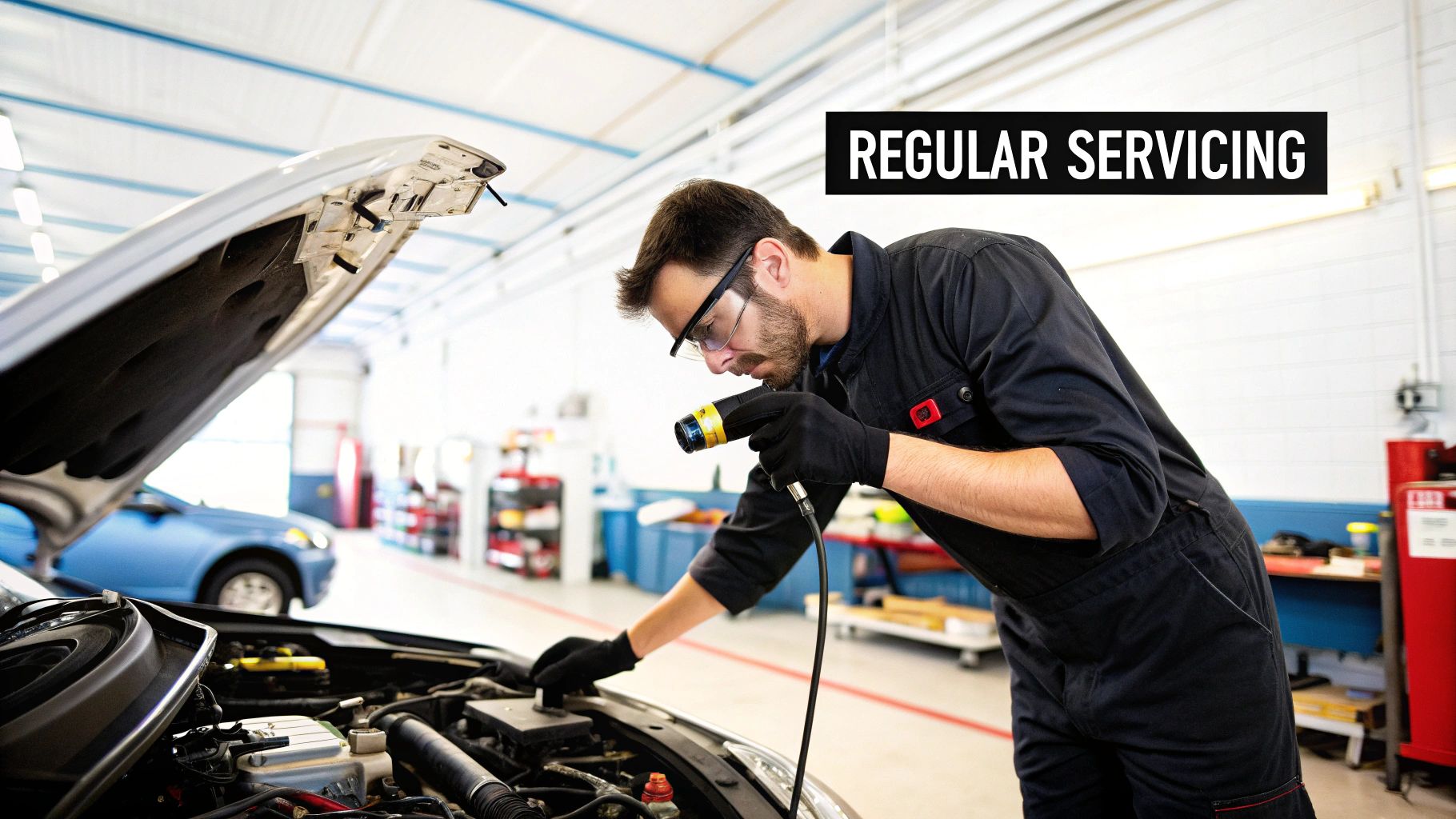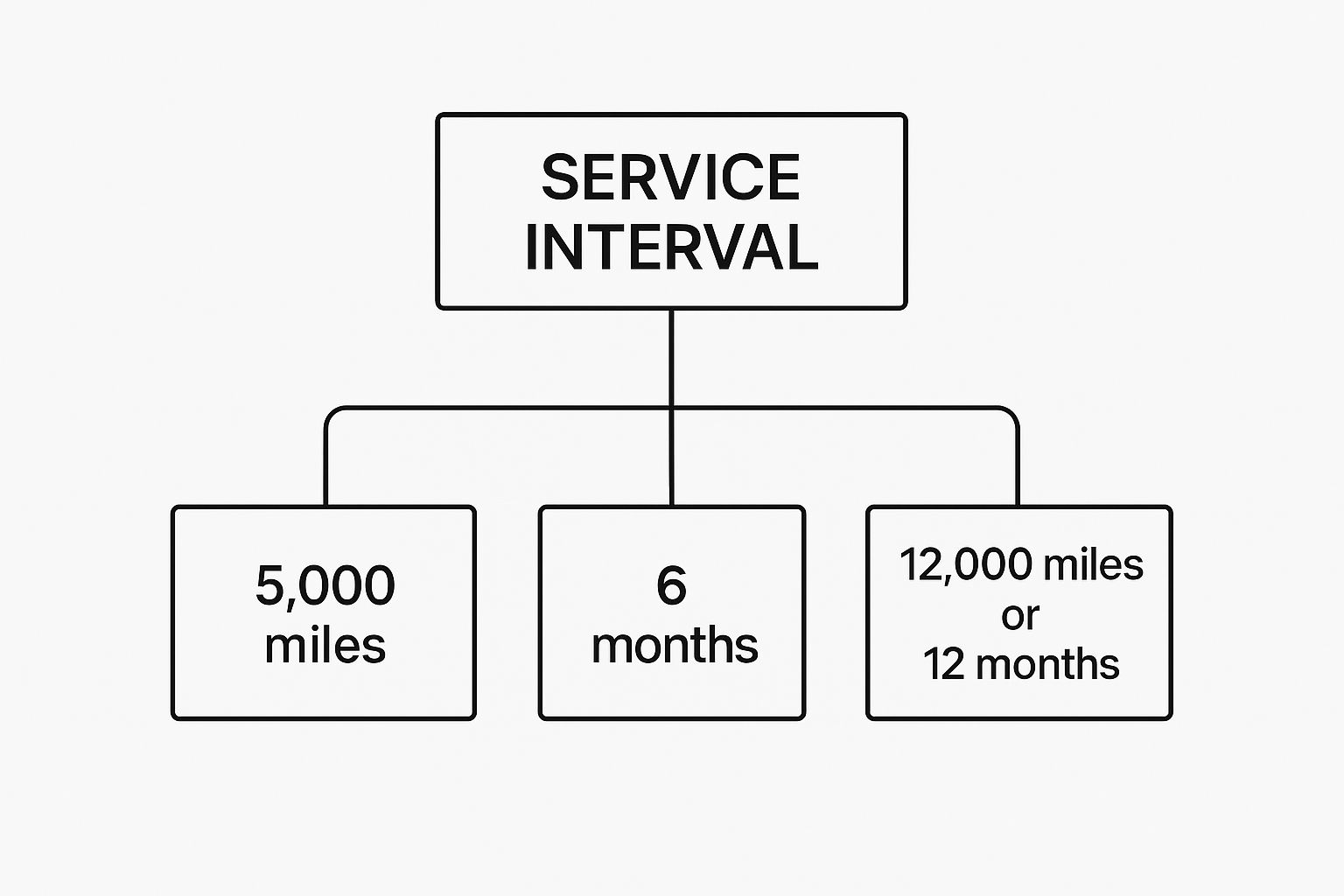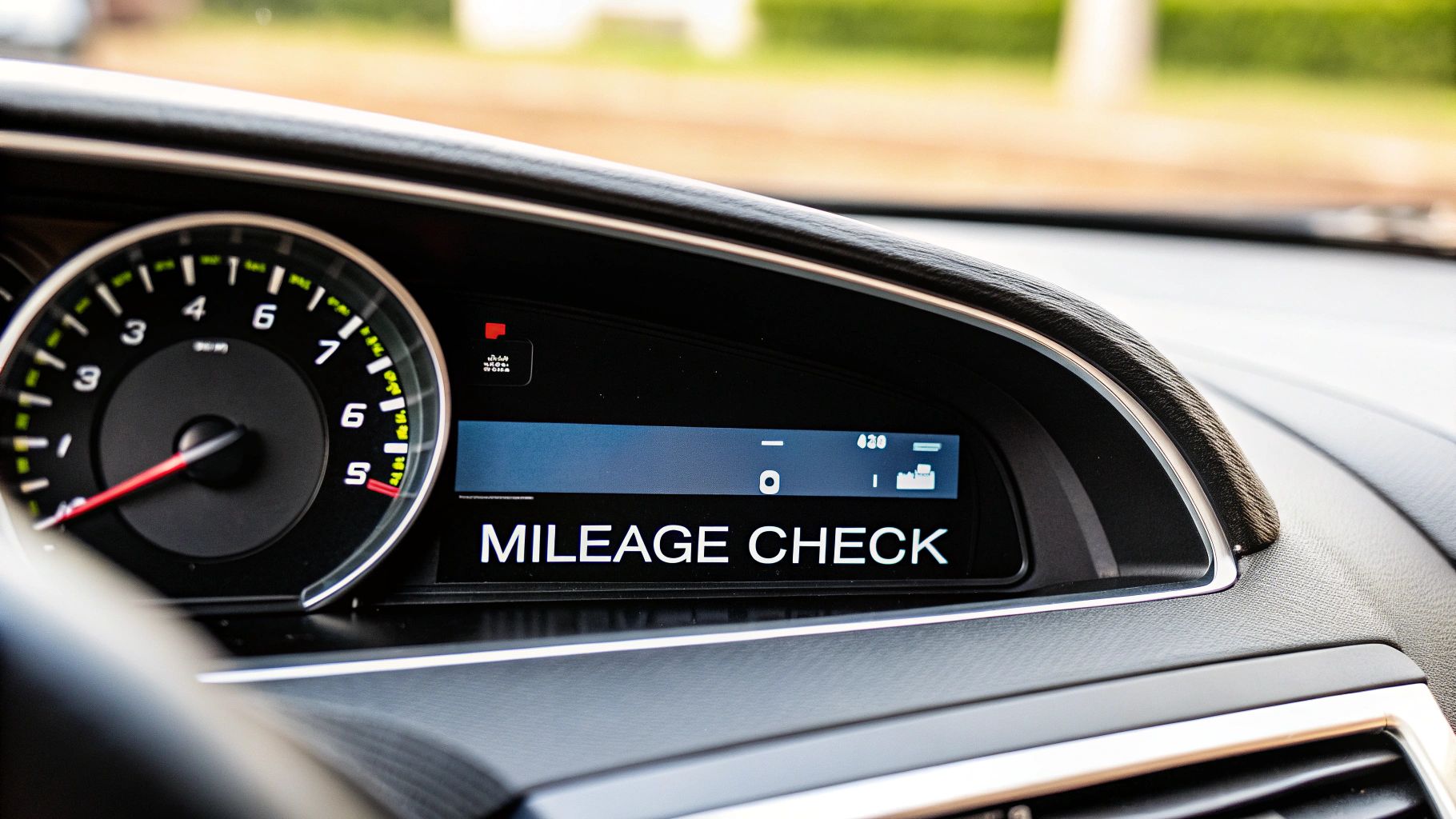How Often Should You Service Your Car? Maintenance Tips
- coledem
- Jul 14, 2025
- 12 min read
How often should you be servicing your car? It is a question we get all the time. A good rule of thumb for most drivers in the UK is to book a full service every 12 months or every 12,000 miles—whichever milestone you hit first. Think of it as your car's annual check-up.
This simple schedule is your best bet for keeping your vehicle running smoothly, safely, and reliably.
Your Car Servicing Schedule Explained

Figuring out the right servicing schedule can feel a bit like guesswork, but there is a solid logic behind it. Sticking to that yearly or 12,000-mile routine is one of the smartest things you can do for your car. It allows a trained mechanic to spot small, brewing problems long before they turn into costly, inconvenient breakdowns.
Of course, what’s included in a service matters just as much as when you get it done. For a complete rundown on the nuts and bolts of it all, we have put together a guide on car servicing explained.
That standard interval is great for the average driver, but what if you're not "average"? Maybe you rack up serious mileage on the motorway, or your daily commute is a stop-start crawl through city traffic. That is where an interim service comes into play.
When to Choose an Interim Service
For drivers who really put their cars through their paces—we're talking high mileage, lots of short journeys, or constant city driving—we recommend an interim service every 6 months or 6,000 miles. This is a smaller, more focused check-up that sits between your main annual services.
An interim service is not as in-depth as a full one, but it covers the main components. It typically includes an oil and filter change, plus a check on crucial components like your lights, tyres, and fluid levels. It is a proactive step that keeps everything topped up and in good working order, especially for cars working harder than most.
Think of it like this: a full service is your car's big annual health MOT. An interim service is like a six-month check-in with the nurse to make sure your blood pressure (or in this case, your oil) is still looking good.
To help you visualise this, here is a quick reference table showing the typical service schedules.
Recommended UK Car Servicing Intervals
Service Type | Recommended Frequency (Time) | Recommended Frequency (Mileage) | Best For |
|---|---|---|---|
Interim Service | Every 6 months | Every 6,000 miles | High-mileage drivers or those with demanding driving conditions. |
Full Service | Every 12 months | Every 12,000 miles | The standard annual check-up for most cars on the road. |
Major Service | Every 24 months | Every 24,000 miles | A comprehensive inspection, replacing key wear-and-tear items. |
Following these guidelines means your car gets the right level of attention at the right time.
While it is written for a different type of vehicle, this essential truck maintenance checklist is a great resource. It highlights the universal principle of preventative care—regular checks are key, no matter what you drive.
Getting to Grips with Different Car Service Types
Just like we have different kinds of health check-ups, cars have different levels of servicing. They are not all the same, and knowing the difference means you can give your car exactly what it needs without spending money on checks it does not. You will generally come across three main types: Interim, Full, and Major services.
Think of an Interim Service as a quick "once-over" for your car. It is perfect for drivers who cover a lot of miles and need a check-in between their big annual services. It usually involves changing the oil and oil filter, topping up crucial fluids like brake fluid and screenwash, and inspecting main components like your tyres, lights, and wipers. It is a great bit of proactive care to keep things running smoothly.
A Full Service is more like your car’s comprehensive annual medical. This is the one most people get, typically recommended every 12 months or 12,000 miles. It covers everything in an interim check but goes much deeper.
What More Do You Get with a Full Service?
A full service builds on the basics by taking a closer look at your car’s core systems. Our mechanics will usually:
Replace the air filter and, for diesel cars, the fuel filter.
Carry out more thorough checks on the brakes, steering, and suspension.
Inspect the full exhaust system for any damage or leaks.
Check the coolant system and the strength of the antifreeze.
This depth of inspection is what keeps your car reliable and efficient all year round. It is the go-to annual service for most drivers here in the UK.
This chart helps to visualise how your mileage and time on the road line up with the different service needs.

As you can see, it is not just about how long it has been, but also how far you have driven. This is your guide to deciding whether an interim or full service is due.
The Full Works: A Major Service
Finally, there is the Major Service. Think of this as a complete, head-to-toe examination by a specialist. It is the most thorough check your vehicle can get, usually recommended every 24 months or 24,000 miles. It includes all the elements of a full service and then some.
A major service looks into your vehicle’s long-term health. It focuses on parts that wear out over longer periods, preventing the kind of gradual wear and tear that can snowball into serious, expensive problems down the line.
During a major service, our technicians will replace parts with a longer lifespan, like the spark plugs in a petrol engine or the cabin filter that keeps the air inside your car fresh. This service is designed to match the two-year maintenance schedules set by manufacturers, catching components before they have a chance to fail.
If you want a complete, point-by-point checklist, have a look at our guide on what a UK car service includes. It breaks down exactly what gets inspected.
Factors That Influence Your Service Schedule

While the old rule of thumb—every 12 months or 12,000 miles—is a decent starting point, it is far from the full story. Think of it more as a general guideline than a strict command. The reality is, how you drive and where you drive are just as important as how long it has been since your last service.
The two most obvious factors are your car’s age and mileage. It is simple, really. An older, high-mileage car has parts that have worked harder and longer. Hoses get brittle with age, gaskets wear thin, and suspension components have soaked up years of bumps and potholes. These cars simply need more attention to spot potential problems before they happen.
How Your Driving Style Affects Your Car
It is not just about the miles you cover, but the kind of miles. Your daily commute and driving habits put a unique stamp on your car's health, placing specific demands on its various systems. Understanding your personal driving profile is the first step towards a smarter, more effective maintenance plan.
Take, for instance, a car used mostly for popping to the shops. These short, local trips mean the engine rarely reaches its ideal operating temperature. This can lead to moisture building up in the oil and exhaust, which is not great for engine health. It also puts more strain on the battery and brakes.
Here are a few common driving habits that mean you should probably book a service sooner rather than later:
Frequent Short Journeys: If your driving is mostly stop-start traffic around Bedford or Biggleswade, your brakes and clutch (if you have a manual) are getting a real workout. Your engine oil also does not get hot enough to properly circulate and do its job of cleaning out contaminants.
Towing Heavy Loads: Pulling a caravan or a hefty trailer puts a massive strain on pretty much everything: the engine, gearbox, brakes, and suspension. This kind of heavy lifting demands more frequent checks, especially on fluids.
Driving in Extreme Conditions: Regularly tackling steep hills, dusty country lanes, or the salty, gritted roads of a classic British winter? This will speed up wear and tear on your tyres, suspension, and the car's underbody.
Understanding these factors is the secret to proper preventative care. By tailoring your service schedule to how you actually use your car, you shift from reacting to problems to actively preventing them. It is the smartest way to sidestep unexpected breakdowns and costly repairs.
Creating a Personalised Service Plan
When you know your driving habits, you can work with us at Krause Autos to build a service plan that makes sense for your car. After all, someone cruising up and down the M1 has very different needs to a driver doing the weekly shop in Sandy. You can explore building the right schedule by reading our [2025 guide for UK drivers on how often to service a car](https://www.krauseautos.co.uk/post/how-often-to-service-a-car-the-2025-guide-for-uk-drivers).
This tailored approach is all about catching minor issues before they spiral into major headaches, keeping your car running safely and reliably for years to come.
Understanding the Cost of Car Maintenance in the UK
Owning a car involves more than just the costs of fuel and insurance. Regular servicing is a key part of the budget, and it is an expense that has crept up noticeably over the years. Getting your head around these changes is the first step to properly planning for the real cost of keeping your car safe and reliable.
The price you pay for a car service is not pulled out of thin air. It is shaped by real-world economic pressures, from the rising cost of replacement parts and general inflation to the wages needed to retain skilled technicians. When these go up, the bill you see at the garage counter inevitably follows.
Recent figures paint a very clear picture. Analysis shows that average yearly maintenance costs have jumped by 33% in the last decade, climbing from about £403 to an expected £606 between 2015 and 2025. This is not just random; it is a direct result of pricier parts and higher labour costs, which are themselves affected by things like rising National Insurance contributions for employers.
Why Servicing Is a Smart Financial Choice
It might feel like an odd thing to say, but spending money on regular servicing is one of the smartest ways to save money on your car over its lifetime. Think of it as a small, planned investment that helps you dodge a huge, unexpected bill down the road.
A routine service gives a trained mechanic the chance to spot small problems before they spiral into something serious. For instance, catching a worn-out belt or a minor fluid leak is a simple fix. Ignore it, and you could be looking at a catastrophic engine failure or a complete brake system overhaul—repairs that are not only far more expensive but also incredibly dangerous. This is what preventative maintenance is all about.
Regular servicing is about more than just ticking a box. It is a financial strategy that protects your vehicle's value, improves its fuel efficiency, and acts as a powerful defence against the massive repair bills that often follow neglect.
Choosing the Right Garage for Better Value
The steady rise in costs has understandably changed how car owners think about servicing. In fact, current data reveals that 72% of all car servicing now happens at independent garages, not main dealerships. Drivers are realising that local, independent workshops like Krause Autos deliver the same high standard of work, using the same quality parts, but often at a much more wallet-friendly price.
Going with an independent specialist does not mean you are cutting corners. It means you are getting honest advice and a more personal touch from technicians who are invested in their local reputation. For more on this, check out our complete guide to the [benefits of annual car servicing](https://www.krauseautos.co.uk/post/annual-car-servicing-benefits-why-every-owner-needs-it-in-2025) and see why it is a good idea for today's car owners.
How New Vehicle Technology Changes Servicing Needs

The cars rolling into our garages today are a world away from the models of even a decade ago. With the rapid rise of electric vehicles (EVs) and hybrids, the old rulebook for car maintenance is being completely rewritten. It is no wonder so many drivers are now asking, "how often should I service my car?" when the very definition of a service is changing.
Think about what is missing when you lift the bonnet of an EV. There is no engine oil to change, no spark plugs to replace, and no cambelt waiting to snap. These traditional mainstays of a full service are simply gone. This fundamental shift means we need a new approach to keeping modern cars running safely and efficiently.
Servicing Needs for Electric and Hybrid Cars
Just because EVs do not need oil changes does not mean they are maintenance-free. Their servicing schedule is just different, focusing on the unique components that come with electric power, alongside the parts that wear out on any car.
At Krause Autos, when we service an EV, we are looking at a new set of priorities. Key checks include:
Battery Health Check: This is the big one. We run diagnostics on the high-voltage battery and its cooling system to make certain it is performing as it should.
Braking System: EVs rely heavily on regenerative braking, which means the traditional brake pads and discs see a lot less action. While this saves wear, it can also lead to them seizing up, so a thorough inspection is a good idea.
Tyres and Suspension: That hefty battery pack puts extra strain on tyres and suspension components. We pay close attention to wear and tear in these high-stress areas.
Software Updates: Modern cars are as much about software as they are about hardware. Just like your phone, vehicles often need updates to fix bugs and improve performance.
As technology continues to advance, understanding these new requirements is key. For more detail, you can explore these electric vehicle maintenance tips.
The question of "how often should you service your car" is shifting away from the old mileage-based oil change. Now, it is a conversation about battery health, software integrity, and the condition of specialist components.
The Changing UK Car Market
This technological revolution is happening right as the UK car market is going through its own transformation. After sales peaked at 2.6 million in 2016, the market saw a contraction of nearly 20% over the next few years. While 2023 brought a welcome 17% recovery, the future remains complex, particularly with a temporary dip in EV sales noted in early 2025.
Since electric vehicles require less of the traditional, routine work, this trend will continue to reshape what drivers—and garages like ours—expect from a car service. Staying informed about the British vehicle market on focus2move.com gives us all a clearer picture of what the future of car maintenance holds.
Common Car Servicing Questions Answered
Even with all the information out there, it is natural to still have questions. We get asked a lot of the same things by drivers, so let us clear up some of the most common queries to help you feel more confident about looking after your car.
What Happens If I Miss a Car Service?
It is an easy mistake to make, especially when life gets busy. In the short term, you probably will not notice much difference. But under the bonnet, things are changing. You could be running on old, sludgy oil or worn-out components, which quietly starts to chip away at your fuel efficiency and performance.
Over time, this neglect can really accelerate wear and tear on critical parts like the engine, brakes, and suspension. If your car is still under warranty, skipping a manufacturer-scheduled service could even void it. Plus, a patchy service history is a major red flag for potential buyers, almost certainly knocking down your car's resale value.
The biggest risk, though, is when a small, cheap-to-fix issue—like a fraying belt or a tiny fluid leak—is left unnoticed. It can snowball into a catastrophic mechanical failure, leaving you stranded at the roadside with a repair bill far bigger than the cost of the service you skipped.
Will Using an Independent Garage Void My Warranty?
This is a big one, and thankfully, the answer is a clear no. Here in the UK, we have 'Block Exemption' regulations, which give you the freedom to have your car serviced at any reputable independent garage without it affecting your manufacturer’s warranty.
There are just two simple conditions:
Quality Parts: The garage has to use parts of Original Equipment (OE) quality or a matching standard.
Following the Schedule: The work must be done according to the manufacturer's official timeline and procedures.
Any professional independent garage worth its salt, like ours, knows these rules inside and out. We have access to the same technical data as the main dealers and use fully compliant parts, making certain your warranty stays intact. The bonus? You often get better value and a more personal, friendly service.
Choosing an independent specialist gives you freedom of choice. You can rely on a trusted local team to maintain your car to the highest standards without being tied to a main dealer.
Is a Car Service the Same as an MOT Test?
Not at all. It is a common mix-up, but a service and an MOT are two completely different things, though both are important for your vehicle.
Think of the MOT as a legally required annual exam. For any car over three years old, its sole purpose is to check that your vehicle meets the minimum safety and environmental standards to be on the road on that particular day. It is a simple pass-or-fail test.
A car service, is proactive healthcare for your vehicle. It is a health check where a technician replaces old fluids and filters and thoroughly inspects a huge range of parts to keep your car running reliably and efficiently. An MOT is a legal snapshot; a service is long-term preventative care.
Do I Need to Service a Low-Mileage Car Every Year?
Yes, absolutely. We strongly recommend servicing your car annually, even if it has not covered many miles. The reason is simple: many crucial fluids and components degrade over time, not just with mileage.
Engine oil, for instance, gets contaminated and loses its protective qualities over 12 months, whether you have driven 1,000 miles or 10,000. Brake fluid is hygroscopic, which is a fancy way of saying it absorbs moisture from the air, lowering its boiling point and making your brakes less effective. Rubber parts like belts and hoses can also go brittle and crack just from age.
An annual service on a low-mileage car tackles all these time-sensitive issues. It also gives a technician the chance to spot problems that crop up from infrequent use, like seizing brake callipers or a battery that is slowly draining. While a service covers the big stuff, it is also wise to think about the smaller details. For instance, knowing how often you should change your key fob battery can save you a lot of hassle down the line.
At Krause Autos, we believe in giving our customers clear, honest advice. Whether you have questions about your service schedule or need an expert to diagnose a problem, our team in Sandy is here to help drivers across Bedfordshire. Get in touch today to book your next service or MOT.
Article created using [Outrank](https://outrank.so)


